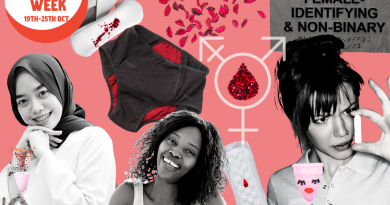Pandora’s Box: Menstrual Equity on Film
Adapted from ‘The crusade for menstrual equity’ by Brian D. Johnson for Maclean’s. Article available at: https://www.macleans.ca/culture/the-crusade-for-menstrual-equity/
Despite the media’s continuous depiction of blood and gore, menstruation is by and large precluded from coverage due to persistent stigma surrounding periods, even though globally, nearly 800 million people are menstruating at any time.
Up until recently, even ardent feminists have been reluctant to address menstrual equality, choosing instead to focus on issues such as workplace equality and childcare. This hesitation is understandable considering the discrimination women often face while on their period in all parts of the world, being deemed impure or disregarded due to a natural biological process.
Thankfully, times are changing, and a prime example of this shift comes in the form of the new Canadian film Pandora’s Box. Set across four continents, the movie follows women in Britain, India, North America, and sub-Saharan Africa who have been denied the right to personal hygiene, whether in prisons, schools, or religious institutions. However, it also provides the viewer with a glimmer of hope, chronicling the emergence of the menstrual equity movement.
A central message of the film is that ‘period poverty’ is a problem which affects menstruators worldwide, despite the traditional images of global poverty commonly depicted by journalists. The approximate seven total lifetime years that menstruators spend bleeding often amounts to more than $8000 in period products.
Not only is menstrual equity an issue of finance and social equality, it is also one of sustainability, with more than 20 billion sanitary napkins disposed of in North American landfills alone each year. To address this growing problem, Carinne Chambers-Saini and her mother invented the DivaCup, a modern version of the menstrual cup (which was invented in the first half of the 20th century). Chambers-Saini is the executive director of Pandora’s Box, although she makes it clear that the film is not a promotional stunt. Not all countries have openly accepted the DivaCup, and in these contexts, the movie advocates for the adoption of reusable menstrual pads. In Nairobi, for example, the film follows Days for Girls, a company which addresses the social stigma of menstruation through the use of bright floral patterns.
Although quite possibly the first feature-length documentary whose subject is menstrual rights, the film is also a sign of changing times. Last year, Period. End of Sentence won Best Documentary Short at the Academy Awards. While a long time coming, it seems as though the taboo surrounding menstruation is starting to unravel, however slowly. For menstruators around the world, this change is long overdue.



